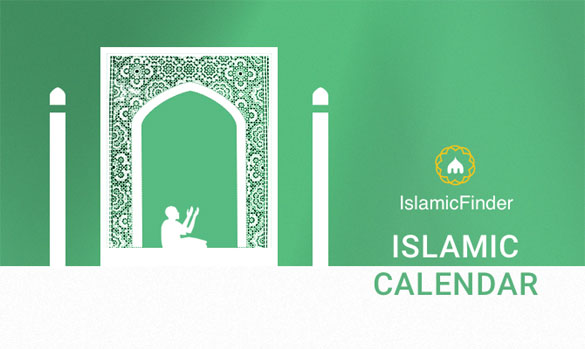When Did The Islamic Hijri Calendar Begin?
 Dr.
Mohammad Najeeb Qasmi, New Age Islam
Dr.
Mohammad Najeeb Qasmi, New Age Islam
12
August 2021
The
month of Muharram is one of the sacred months
Main
Points
1. Muharramul Haram is the first month of the Islamic
calendar
2. There are 365 or 366 days in the Gregorian
calendar, while there are 354 days in the Hijri calendar
3. The Hijri calendar was first introduced in
the time of Hazrat Umar (May Allah be pleased with him) after 17 years of Hijra
4. Numerous acts of worship in Islamic law are
linked to the Hijri calendar
5. We should think whether we have done good
deeds or bad deeds out of negligence that may make us among the losers in the
world to come
6. Did we take any step to teach our children what
will be helpful for them in attaining success in the next never-ending life
7. Let’s all promise to ourselves on this New
Hijri Year that we will strive to please Allah in the remaining days of our
life
---------
Muharramul
Haram is the first month of the Islamic calendar, i.e. the Hijri year starts
off with Muharramul Haram and concludes with Dhul-Hijjah. In addition,
Muharramul Haram is one out of such four months that have been called as the
months of sanctity by the Almighty Allah. Holy Prophet (صلى الله عليه وسلم) has declared this month as the month of the Almighty Allah.
Although, each and every day and month belongs to the Almighty Allah, but
linking this month with the Almighty Allah emphasizes its superiority. Another
merit of the month of Muharram is that fasting in it is of the greatest value
(second only to the fasts of Ramadanul Mubarak). Hazrat Ali (May Allah be
pleased with him) says: One day I was sitting with the Holy Prophet (PBUH), a
person came and asked: O Prophet of Allah (PBUH), which month would you order
me for fasting besides the month of Ramadan. Holy Prophet (PBUH) said, if you
want to fast besides the month of Ramadan, then fast in Muharram as it is the
month of Allah. There is a day in this month on which the Almighty Allah
accepted the repentance of a race and He would accept the repentance of other
people too. (Tirmizi, Vol: 1 P 157). The race that was pardoned this day was
Bani Israel as it is explained in Hadeeth that the Almighty Allah granted
salvation to HazratMusa (AS) and Bani Israel against Pharaoh and his troupe.

The
question that strikes everyone’s mind very often is as to why the Islamic year
started from the month of Muharram. The Prophet (peace and blessings of Allah
be upon him) migrated to Madinah in the month of Rabi Al-Awwal.
Before
I answer to this question, let's look at some points on which almost all
historians agree:
1. The Islamic calendar (Hijricalender) was
not used in the time of the Prophet (peace and blessings of Allah be upon him).
It was first introduced in the time of Hazrat Umar Farooq (May Allah be pleased
with him) after 17 years of Hijra with the consensus of the then present
companions (Sahabah).
2. Although the Hijri calendar was
introduced in the time of Hazrat Umar Farooq, the names and orders of all the
12 Islamic months existed for quite a long time back, even before the time of
the Prophet (peace and blessings of Allah be upon him). And out of these 12
months, four months (Dhu al-Qa'dah, Dhu'l-Hijjah, Muharram al-Haram and Rajab
al-Marjab) were defined as sacred months since ancient times. Allah the
Almighty says in the Glorious Qur'an: “The number of months in the sight of
Allah is twelve in the Book of Allah from the day He created the heavens and
the earth, four of them are sacred. (Surah At-Tawbah, Verse 36)
3. Before the introduction of the Hijri
calendar, the year was named after various events in the Arabs. Due to which
different calendars were prevalent among the Arabs. But each calendar started
from Muharram.
Now
the answer is that when it came to launching a new Islamic calendar in the time
of Hazrat Umar Farooq, the Companions suggested different criteria for
beginning of the Islamic calendar such as birth of the Prophet (peace and
blessings of Allah be upon him), advent of prophet-hood and migration to
Madinah. Ultimately, the companions agreed on migration to Madinah and started
the Islamic calendar based on the year of Hijrah to Madinah. It means all the
years before the migration to Madinah were made zero and the year of the
migration to Madinah was recognized as the first year. As for the order of the
months, it was arranged according to the all the various calendars prevalent in
the Arabs, that is, the beginning of the year from Muharram. As explained
earlier, among the Arabs, the month of Muharram was the first month of the year
since ancient times, so it was not changed in the Islamic calendar either. Thus
the new Islamic calendar began with the migration from Medina, but the order of
the months remained the same.
As per
the solar system, there are 365 or 366 days in the Gregorian calendar, while
there are 354 days in the Hijri calendar. But all calendars have 12 months. In
the Hijri calendar the month is either 29 or 30 days while in the Gregorian
calendar seven months are of 31 days, four months are 30 days and one month is
28 or 29 days. The system of both the sun and the moon is made by Allah.
Numerous acts of worship in Islamic law are linked to the Hijri calendar. Due
to the difference of 10 or 11 days in both the calendars, the time of certain
worships varies from season to season. This change of seasons is also a sign of
Allah Almighty. We should pounder over and invite others to reflect on how the
weather changes. Obviously, this is the command of Allah alone, Who created the
seasons, and in each season He has ordained many things according to the
seasons, as Allah says: “Surely in the creation of the heavens and the earth
and in the alternation of night and day, great signs of Allah for those who
have understanding and remember Allah while sitting and reclining, and reflect
on the creation of the heavens and the earth, and say: Our Lord! You did not
create all this in vain. You are free (from such nonsense). So save me from the
torment of Hell. (Surah Al-Imran, Verse 190 – 191)
Let’s
all promise to ourselves on the commencement of the New HijriYear that we will
strive to please Allah in the remaining days of our life. We are enjoying life
but we don’t know when the angel of death will take out our life. The Messenger
of Allah (PBUH) said: “Take advantage of five matters before five other
matters: your youth, before you become old; and your health, before you fall
sick; and your richness, before you become poor; and your free time before you
become busy; and your life, before your death.”(Mustadrak Hakim and
MusannafIbnAbiShaibah) The Prophet (PBUH) also said: "The two feet of the
son of Aadam will not move from near his Lord on the Day of Judgment until he
is asked about five (matters):- 1) about his life - how he spent it; 2) about
his youth - how he took care of it; 3) about his wealth - how he earned it; 4)
and where he spent it; 5) and about that which he acted upon from the knowledge
that he acquired." Dear brothers, we all have to stand one day before our
Creator, Master and Sustainer and will be questioned as to what we have done
with our lives by Allah Who is nearer to
us than our jugular vein, Who created us and is controlling everything.
All
that we have gained from the last 354 days is nothing but a few sweet and
bitter memories that we still have in our mind. Otherwise, we have forgotten
all the past days as if we didn’t live them at all. What we actually should do
on this occasion inspect ourselves by looking back at the passed days and
trying to recall how many vitreous or evil deeds we have added to our ‘action
sheet’. We should think whether we have succeeded to add such good deeds to the
list of our actions that may benefit and bring happiness to us in the hereafter
or have we, out of negligence and carelessness, got some more sins inscribed in
the ‘action sheet’ that may make us among the losers in the world to come. We
should realize if we observed the Islamic rituals such as Salah, Sawm, Sadaqa
in the proper manner. Did we try to perform Salah with utmost humility and
veneration (Khushu’ and Khudu’) or it was the same way we have been doing our
worship since childhood? Did fasting helped us develop fear of Allah in us or
it was a mere morning to evening starvation? Did we ever think of helping a
needy person, an orphan or a widow? Did we rectify our behavior? Did we try to
transform our conduct into that of the Messenger of Allah (PBUH)? Did we impart
whatever religious knowledge we have to others? Did we take any step to teach
our children what will be helpful for them in attaining success in the next
never-ending life or was all that we cared providing them with modern education
and worldly comforts? Did we try to help people during the running year or did
we cause only troubles for them? Did we help the orphans and the widows or were
we just spectators? Did we try to fulfill the rights that the Qur’an has upon
us? Did we truly obey Allah and His Messenger (PBUH) throughout the year? Did
we fulfill the rights of our parents, neighbors and the relatives?
URL:
New Age Islam, Islam Online, Islamic Website, African Muslim News, Arab World News, South Asia News, Indian Muslim News, World Muslim News, Women in Islam, Islamic Feminism, Arab Women, Women In Arab, Islamophobia in America, Muslim Women in West, Islam Women and Feminism
